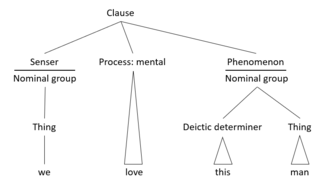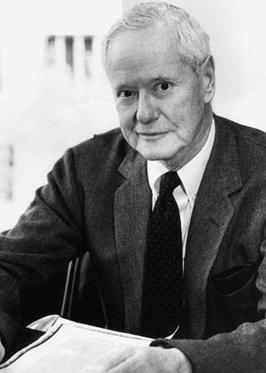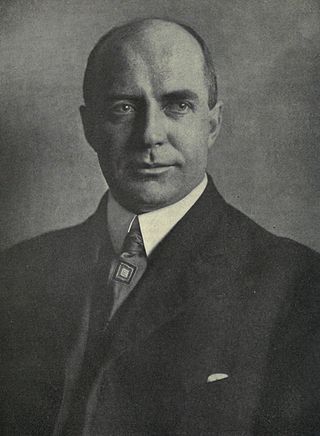
Functional linguistics is an approach to the study of language characterized by taking systematically into account the speaker's and the hearer's side, and the communicative needs of the speaker and of the given language community. Linguistic functionalism spawned in the 1920s to 1930s from Ferdinand de Saussure's systematic structuralist approach to language (1916).

Robert King Merton was an American sociologist who is considered a founding father of modern sociology, and a major contributor to the subfield of criminology. He served as the 47th president of the American Sociological Association. He spent most of his career teaching at Columbia University, where he attained the rank of University Professor. In 1994 he was awarded the National Medal of Science for his contributions to the field and for having founded the sociology of science.

Structural functionalism, or simply functionalism, is "a framework for building theory that sees society as a complex system whose parts work together to promote solidarity and stability".
The Chicago school refers to a school of thought in sociology and criminology originating at the University of Chicago whose work was influential in the early 20th century.

Florian Witold Znaniecki was a Polish and American philosopher and sociologist who taught and wrote in Poland and in the United States. Over the course of his work, he shifted his focus from philosophy to sociology. He remains a major figure in the history of Polish and American sociology; the founder of Polish academic sociology, and of an entire school of thought in sociology.
Neofunctionalism is the perspective that all integration is the result of past integration. The term may also be used to literally describe a social theory that is "post" traditional structural functionalism. Whereas theorists such as Jeffrey C. Alexander openly appropriated the term, others, such as the post-structuralist philosopher Michel Foucault, have been categorized as contemporary functionalists by their critics.

Microsociology is one of the main levels of analysis of sociology, concerning the nature of everyday human social interactions and agency on a small scale: face to face. Microsociology is based on subjective interpretative analysis rather than statistical or empirical observation, and shares close association with the philosophy of phenomenology. Methods include symbolic interactionism and ethnomethodology; ethnomethodology in particular has led to many academic sub-divisions and studies such as micro-linguistical research and other related aspects of human social behaviour. Macrosociology, by contrast, concerns the social structure and broader systems.

Sociology as a scholarly discipline emerged, primarily out of Enlightenment thought, as a positivist science of society shortly after the French Revolution. Its genesis owed to various key movements in the philosophy of science and the philosophy of knowledge, arising in reaction to such issues as modernity, capitalism, urbanization, rationalization, secularization, colonization and imperialism.

In social science, antipositivism is a theoretical stance which proposes that the social realm cannot be studied with the methods of investigation utilized within the natural sciences, and that investigation of the social realm requires a different epistemology. Fundamental to that antipositivist epistemology is the belief that the concepts and language researchers use in their research shape their perceptions of the social world they are investigating and seeking to define.
Herbert George Blumer was an American sociologist whose main scholarly interests were symbolic interactionism and methods of social research. Believing that individuals create social reality through collective and individual action, he was an avid interpreter and proponent of George Herbert Mead's social psychology, which he labeled symbolic interactionism. Blumer elaborated and developed this line of thought in a series of articles, many of which were brought together in the book Symbolic Interactionism. An ongoing theme throughout his work, he argued that the creation of social reality is a continuous process. Blumer was also a vociferous critic of positivistic methodological ideas in sociology.

William Isaac Thomas was an American sociologist, understood today as a key figure behind the theory of symbolic interactionism.

A sociological theory is a supposition that intends to consider, analyze, and/or explain objects of social reality from a sociological perspective, drawing connections between individual concepts in order to organize and substantiate sociological knowledge. Hence, such knowledge is composed of complex theoretical frameworks and methodology.

In sociology, social psychology studies the relationship between the individual and society. Although studying many of the same substantive topics as its counterpart in the field of psychology, sociological social psychology places relatively more emphasis on the influence of social structure and culture on individual outcomes, such as personality, behavior, and one's position in social hierarchies. Researchers broadly focus on higher levels of analysis, directing attention mainly to groups and the arrangement of relationships among people. This subfield of sociology is broadly recognized as having three major perspectives: Symbolic interactionism, social structure and personality, and structural social psychology.

Sociology of terrorism is a field of sociology that seeks to understand terrorism as a social phenomenon. The field defines terrorism, studies why it occurs and evaluates its impacts on society. The sociology of terrorism draws from the fields of political science, history, economics and psychology. The sociology of terrorism differs from critical terrorism studies, emphasizing the social conditions that enable terrorism. It also studies how individuals as well as states respond to such events.
Alvin Ward Gouldner was an American sociologist, lecturer and radical activist.
A humanistic coefficient is a conceptual object, methodological principle, or method of conducting social research wherein data analysis stresses the perceived import of analyzed experiences to their participants. The term was coined by Polish sociologist Florian Znaniecki.

Sociology is the scientific study of human society that focuses on society, human social behavior, patterns of social relationships, social interaction, and aspects of culture associated with everyday life. Regarded as a part of both the social sciences and humanities, sociology uses various methods of empirical investigation and critical analysis to develop a body of knowledge about social order and social change. Sociological subject matter ranges from micro-level analyses of individual interaction and agency to macro-level analyses of social systems and social structure. Applied sociological research may be applied directly to social policy and welfare, whereas theoretical approaches may focus on the understanding of social processes and phenomenological method.

The Polish Peasant in Europe and America is a book by Florian Znaniecki and William I. Thomas, considered to be one of the classics of sociology. The book is a study of Polish immigrants to the United States and their families, based on personal documents, and was published in five volumes in the years 1918 to 1920.
In philosophy and sociology, culturalism is the central importance of culture as an organizing force in human affairs. It is also described as an ontological approach that seeks to eliminate simple binaries between seemingly opposing phenomena such as nature and culture.
Biographical research is a qualitative research approach aligned to the social interpretive paradigm of research. Biographical research is concerned with the reconstruction of life histories and the constitution of meaning based on biographical narratives and documents. The material for analysis consists of interview protocols (memorandums), video recordings, photographs, and a diversity of sources. These documents are evaluated and interpreted according to specific rules and criteria. The starting point for this approach is the understanding of an individual biography in terms of its social constitution. The biographical approach was influenced by the symbolic interactionism, the phenomenological sociology of knowledge, and ethnomethodology. Therefore, biography is understood in terms of a social construct and the reconstruction of biographies can give insight on social processes and figurations, thus helping to bridge the gap between micro-, meso-, and macro- levels of analysis. The biographical approach is particularly important in German sociology. This approach is used in the Social Sciences as well as in Pedagogy and other disciplines. The Research Committee 38 "Biography and Society" of the International Sociological Association (ISA) was created in 1984 and is dedicated "to help develop a better understanding of the relations between individual lives, the social structures and historical processes within which they take shape and which they contribute to shape, and the individual accounts of biographical experience ".







